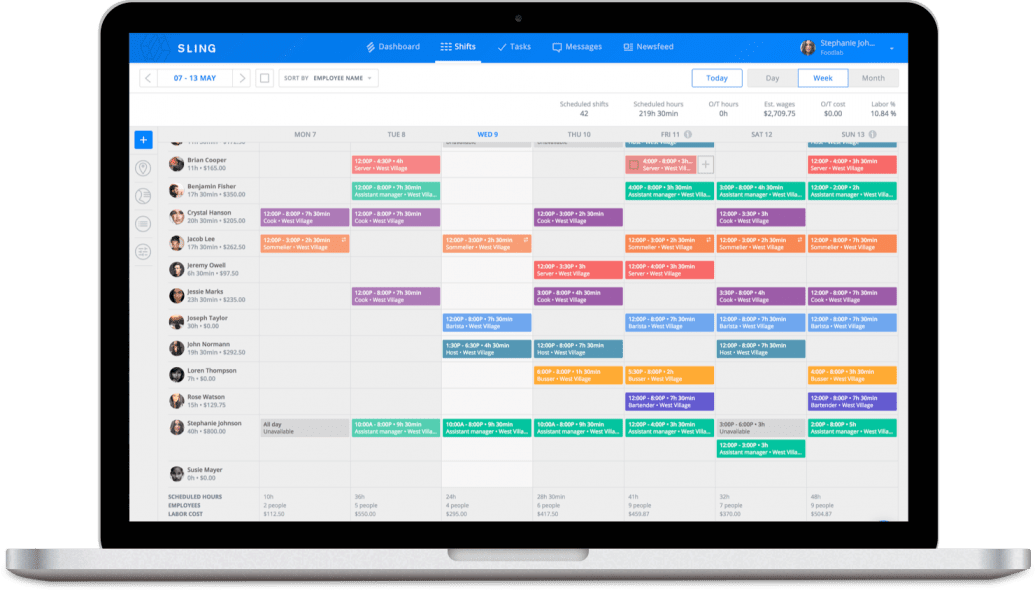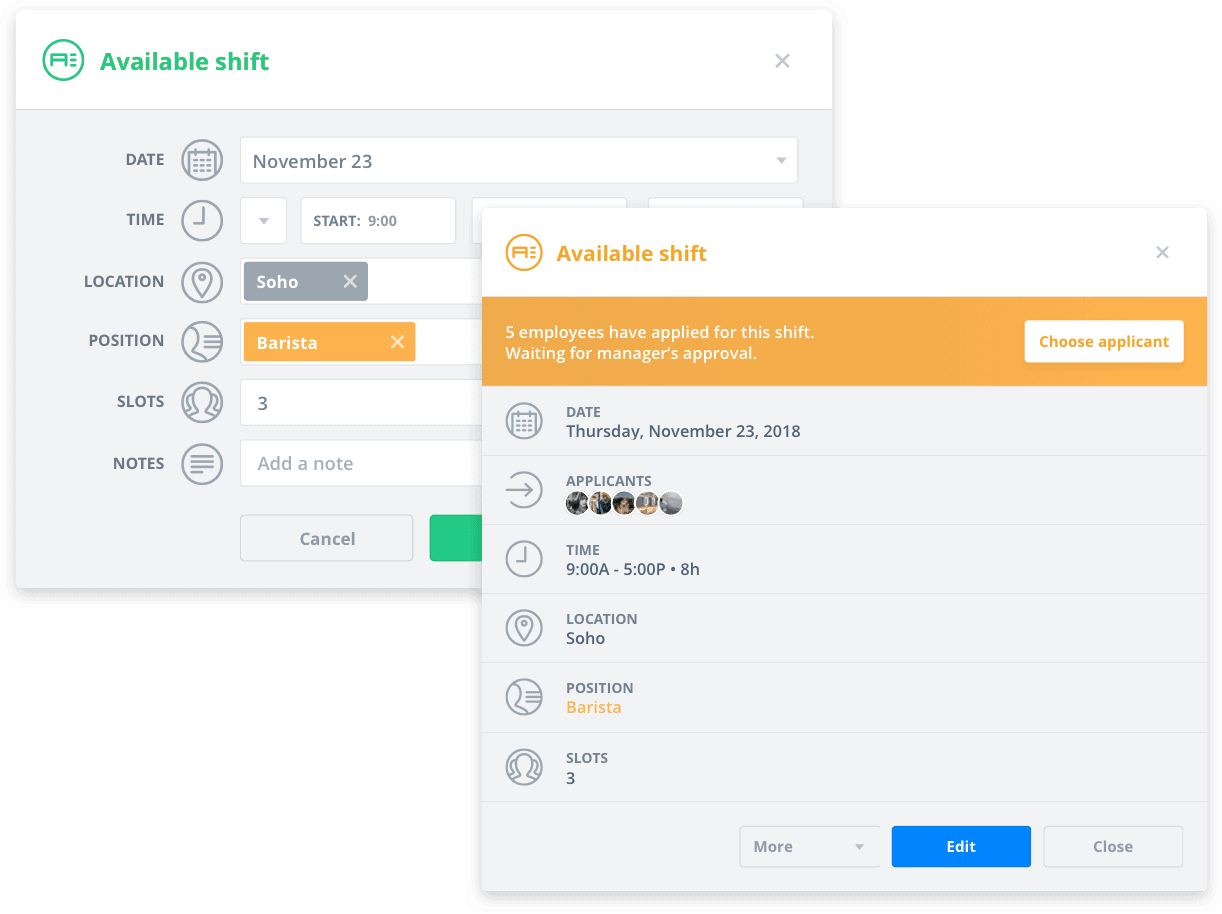How To Do A Write Up

As a manager, your calendar is always full. You have to coordinate employee scheduling, inventory management, hiring, advertising, training, and the daily activities of your business. Some of those responsibilities—like firing and disciplining—can add even more strain to an already stressful job. So what's a busy manager to do when faced with the need for disciplinary action? The answer is simple: use an employee write-up form.
In this article, the experts at Sling will show you the benefits of using an employee write-up form and give you four tips to make sure your form is complete. We'll also provide five effective employee write-up forms that you can use in your business.
The Benefits Of An Employee Write-Up Form
There are many benefits to using an employee write-up form, but the two most important are described below.
A Record For Your Own Reference

You can't (and shouldn't) be expected to remember everything that goes on in your business every day. But you should document events that may be important later on.
For example, if there is a problem with an angry customer, write down the details. If you're conducting an employee evaluation, record the highlights in the employee's file. And if you have to discipline one of your team members, use an employee write-up form.
Protect Against Legal Liability
When you use an employee write-up form to document disciplinary action, you are also protecting yourself against future legal liability. It's all too easy for a disgruntled employee to claim that he was mistreated because of a small infraction. This can happen months—or even years—after the employee has left your business.
You can ensure that you have all the details for your defense by filling out an employee write-up form and storing it in the employee's permanent file. Keep these forms and files for a minimum of three years after the employee leaves your business.
Facilitate Progressive Discipline
Your employee write-up form should be a small part of a system of progressive discipline that deals with various unacceptable behaviors.
The unacceptable behaviors are yours to define in the company handbook, but the progressive discipline follows a fairly well-established pattern:
- Verbal warning
- Written warning
- Suspension (or other penalty)
- Termination
Depending on the infraction, you can add steps to the discipline. Or, in the case of egregious behaviors, go right from verbal warning to termination.
Whatever steps of progressive discipline you choose, be sure to explain the causes and effects of unacceptable behavior in your employee handbook.
Set Standards For Managers And Supervisors
In businesses with multiple department managers, the very real possibility exists that each supervisor will have differing ideas about when and how to discipline the members of their team.
Those inconsistencies create a clunky and confusing system of behavior and consequences that your employees — and even the managers who mete out the discipline — won't be able to decipher.
Some managers will be too lenient — both in when and how to punish — while other managers will be too strict.
So if an employee working under one manager was not disciplined for a certain behavior but was disciplined heavily by another manager, the message is obviously very confusing for that employee.
The confusion inherent in a system without standards leads to feelings of mistreatment and unfairness that can lower productivity and increase employee turnover.
Provide Structure For Employees
When employees understand the penalties for poor behavior (Progressive Discipline section) and witness these penalties levied on a consistent basis (Standards For Managers section), they become more comfortable with the structure or rules in which they work.
Ultimately, a well-established disciplinary and behavioral structure fosters higher employee satisfaction and productivity because team members know the boundaries in which they are working.
Tips For Using An Employee Write-Up Form

1) Refer To Your Employee Handbook
It's essential to note the specific employee handbook policy or procedure that your team member violated. That way, you can't be accused of unfair treatment.
2) Be Specific
Remember, one of the main purposes of the employee write-up form is to record details for future reference (when you likely won't remember exactly what happened). That's why it's vital to be as specific as possible with your documentation.
For instance, if you have to report an employee for being late multiple times, don't just write, "She was late three times in May." Instead, record each incident with the following information:
- Date
- How late the employee was (e.g., 30 minutes)
- Reason given for tardiness
3) Include Relevant Witness Statements
Witness statements are a key component of every employee write-up form.
Without witnesses, the entire issue becomes your word against the employee's (or vice versa). And if legal action ever becomes necessary, that is not a strong foundation on which to base your case.
When taking witness statements, follow the same stringent guidelines you would for legal documentation. For example:
- Witness statements should be descriptions of fact, not opinion
- Witness statements should provide details as to an ongoing, developing behavior
- Witness statements should, if possible, describe previous disciplinary actions to correct behavior
4) Meet Face-To-Face
When you've finished filling out the employee write-up form, schedule a meeting with the team member to review the information. If possible, schedule the meeting for the next day so emotions — yours and the employee's — aren't still running high.
Be sure to include a trusted employee or another manager in the meeting to confirm what you and your employee say and do.
During the face-to-face, in a neutral voice, express your concerns about the employee's behavior. Then list each example and refer back to company policy regarding those behaviors. Remind the employee that they read and agreed to those policies when you hired them and that they are still in effect.
Finally, explain what happens next and what future penalties for poor behavior will be.
5) Get The Employee's Signature
Always have your employee sign the write-up form after you meet and explain what you wrote. This ensures that the employee can't come back later and claim you never informed him that he was being disciplined. If the person refuses to sign, note it on the form.
6) Give The Employee An Opportunity To Respond

An effective employee write-up form should include information from the employee's perspective as well. Perhaps there was a misunderstanding that can be cleared up by hearing the other side of the story.
If you don't consider the employee's response, it could look like neglect on your part if the employee chooses to pursue legal action.
7) Set Expectations For Improvement
Some employee write-up forms include an action plan for employee improvement. Be sure to set expectations in writing so the team member knows where they go from here. If your form doesn't have a place for expected improvement, relate those actions to the employee during your face-to-face meeting.
When communicating corrective feedback of this kind, be sure to focus on the issue, not the person, and include concrete steps the employee can follow.
Think of this corrective feedback as a set of instructions, or a road map, that the employee must follow to improve their behavior and the way they work.
It's also crucial that you list the repercussions should they choose not to follow your corrective feedback. That will provide both of you with a structure for what comes next.
8) Keep A Copy In The Employee's Personnel File

Once you've completed your face-to-face meeting, make a copy of the write-up and give it to the employee to keep.
Place the other copy in the employee's personnel file for future reference. Should you have to terminate the employee for some reason, keep their personnel file for one year after the date of termination.
If the discipline is among the early stages of your progressive system, refer back to these records should the employee get involved in another issue.
9) Follow Up At A Later Date
Your disciplinary process shouldn't end once the employee leaves your office. Always follow up with the employee in the weeks and months following the infraction.
Ideally, you should list the various follow-up dates on your written form so the employee knows when to expect you to schedule a meeting.
If the employee has not improved, you both know what the next steps are because you listed them on your write-up form. There's no room for the employee to claim that they didn't know, so the responsibility for their actions is all on them.
Now that we've discussed the "how" and "why," here are five examples of effective employee write-up forms.
5 Effective Employee Write-Up Forms
Use the forms included below "as-is" or alter them to fit your specific needs.
1) Employee Write-Up Form With Checklist
Date: ____________________
Employee Name: _____________________________________
Date Of Incident: ______________________________
Manager On Duty: _____________________________________
Reason For Write-Up:
- Missed shift without calling manager in advance
- Left work early without permission from manager on duty
- Left work for non-work related business during shift
- Conflict with other employee(s)
- Violation of cell phone policy
- Inappropriate use of company computers
- Other (please explain below):
________________________________________________________________________
________________________________________________________________________
________________________________________________________________________
Additional information from manager: __________________________________________
________________________________________________________________________
________________________________________________________________________
Additional information from employee: _________________________________________
________________________________________________________________________
________________________________________________________________________
___________________________________ _______________________________
Manager's Signature Date Employee's Signature Date
2) Write-Up Form With Improvement Plan
Date: ________________________________
Employee: ____________________________
Manager: _____________________________
Reason For Write Up:
__________________________________________________________________________
__________________________________________________________________________
__________________________________________________________________________
Probation To Begin On: ______________________________________
Probation To Continue Through: _______________________________
Goals To Be Achieved During Probation:
__________________________________________________________________________
__________________________________________________________________________
__________________________________________________________________________
Violation of probation or failure to achieve goals during that time will result in:
- Suspension
- Termination
_______________________________________________
Manager's Signature Date
I understand the reason(s) for my probation and the goals set forth in this form. I understand that if I violate my probation, or if I fail to reach said goals, I will be subject to the action indicated above.
____________________________________________
Employee's Signature Date
3) Detailed Employee Write-Up Form
Employee: _____________________________________
Position: _______________________________________
Manager: ______________________________________
Type Of Action:
- Verbal Warning
- Written Warning
- Suspension
- Termination
Date Of Incident: ____________________________
Time Of Incident: ____________________________
Description Of Incident: ____________________________________________________________________________
____________________________________________________________________________
Reported By: _________________________________
Other individuals who have information: ___________________________________________________
Supporting Evidence (describe or attach documentation, if any): _________________________
____________________________________________________________________________
Employee's Description Of Incident: _______________________________________________
____________________________________________________________________________
Other individuals who have information: ____________________________________________
Supporting Evidence (describe or attach documentation, if any): _________________________
____________________________________________________________________________
____________________________________________________________________________
__________________________________ ___________________________________
Manager's Signature Date Employee's Signature Date
4) Write-Up Form With Action Taken
Name Of Employee: ______________________________________
Employee's Job Title: _____________________________________
Date & Time Of Incident: ___________________________________
Location Of Incident: ______________________________________
Description Of Incident: ________________________________________________________
___________________________________________________________________________
___________________________________________________________________________
Witnesses (if any): ____________________________________________________________
Was this incident in violation of company policy as outlined in the employee handbook?
- Yes
- No
If yes, specify which policy was violated and how: ____________________________________
____________________________________________________________________________
What action will be taken regarding this incident? _____________________________________
____________________________________________________________________________
Has the employee been made aware of the need for this discipline? ______________________
What explanation did the employee offer about the incident? ____________________________
____________________________________________________________________________
____________________________________________
Manager's Signature Date
5) Employee Write-Up Form With Employee Statement
Employee Name: ____________________________
Date Of Notice: ______________________________
Manager's Name: ____________________________
Details Of Incident (include impact on Company): ____________________________________
____________________________________________________________________________
____________________________________________________________________________
Corrective Action:
- Verbal warning
- Written warning
- Suspension with pay
- Suspension without pay
- Termination
- Other: __________________________________________
Expected Improvement: _________________________________________________________
____________________________________________________________________________
____________________________________________________________________________
Employee Statement (use back if necessary): _______________________________________
____________________________________________________________________________
____________________________________________________________________________
By signing this notice, I acknowledge that I have been counseled about the inappropriate conduct and the consequences if I do not make improvement.
_____________________________________ ___________________________________
Manager's Signature Date Employee's Signature Date
Make Your Job Easier

The primary purpose of the employee write-up form is to make your job easier, both now and in the future. Maintaining records of this kind helps reduce the stress and strain on you and your business when issues arise.
Another way that you can make your job easier and mitigate stress is to schedule your employees to avoid problems in the first place. The Sling app can help.
Scheduling your employees is one of the most time-consuming activities you will face as a manager. But that task can be simplified significantly when you use scheduling software like Sling.
Sling is a suite of tools that combines cloud-based distribution with powerful scheduling features to simplify even the most elaborate employee timetable. With Sling, you can:
- Copy schedules between days and weeks
- Drag and drop shifts where you want them
- Create recurring shifts that appear in the same place every time
- Track clock in/clock out times
- Manage labor costs
And that's just the tip of the Sling iceberg. The app also helps you eliminate conflicts during the scheduling process with alerts and notifications. Other powerful features help you minimize no call, no show employees and get everyone to work on time.

In addition to all the intuitive tools you'd expect from software that's dedicated to scheduling, Sling provides guidance and helps you avoid conflicts with up-to-date availability and time-off requests. Sling even notifies you of overlapping shifts or double-bookings.
You can even set up push notifications to remind your team members when they are scheduled. And the fact that Sling works anywhere, all the time, means you can keep your team informed and engaged and build a better team without being in your office 24/7.
There's no more powerful way to streamline the scheduling process than to use a cloud-based scheduling software like Sling. So if you're wondering how to run your business better and keep your employees happy, start with this simple solution.
For more free resources to help you manage your business better, organize and schedule your team, and track and calculate labor costs, visit GetSling.com today.
How To Do A Write Up
Source: https://getsling.com/blog/employee-write-up-form/
Posted by: jonessuas1985.blogspot.com

0 Response to "How To Do A Write Up"
Post a Comment